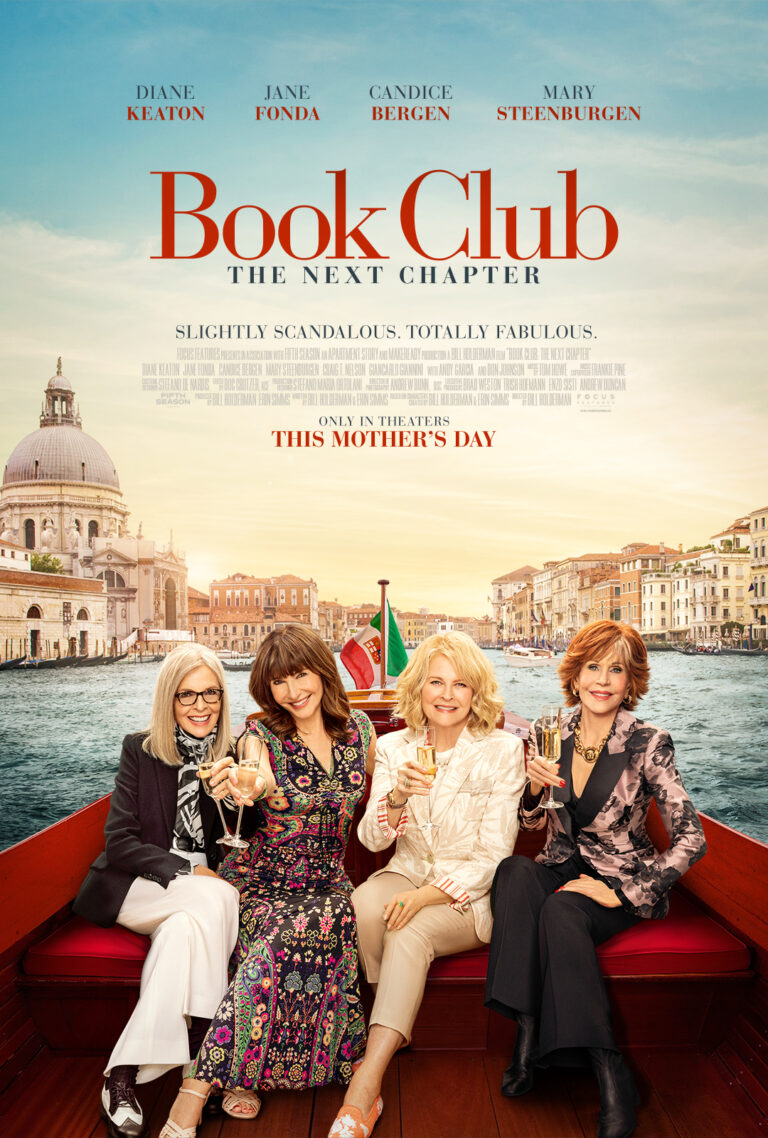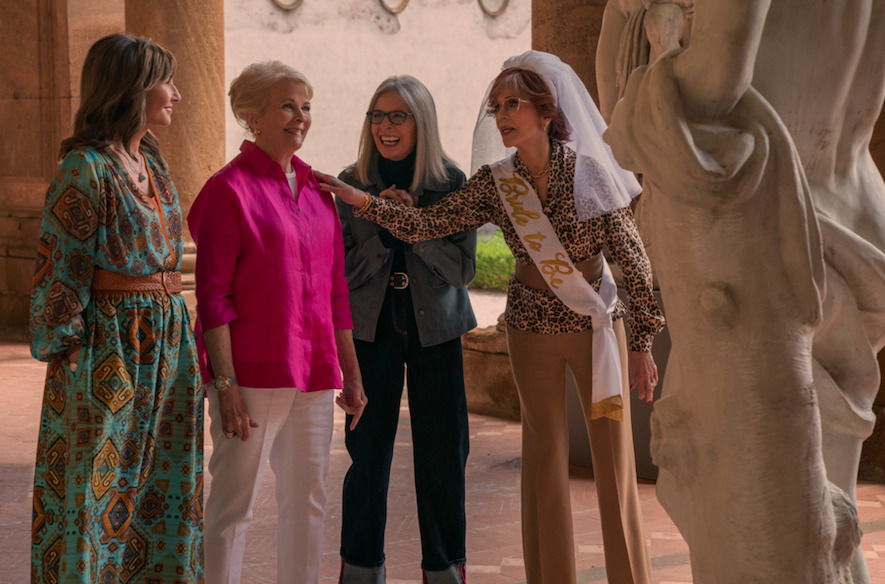
Life and art have a vigorous osmosis. Filmmaker Bill Holderman exemplified this with his directorial debut: the 2018 romantic comedy Book Club. The entertaining flick showed how the readings of four friends, during their monthly book club, would affect their personal lives. The success of this cinematic guilty pleasure has lead to a sequel, Book Club: The Next Chapter.
The first film was inspired by the experience of director/co-writer Bill Holderman and co-writer/producer Erin Simms, who sent their respective mothers a copy of Fifty Shades of Grey. The current sequel is influenced by The Alchemist as Diane (Diane Keaton), Vivian (Jane Fonda), Sharon (Candice Bergen), and Carol (Mary Steenburgen) enjoy their literary adventures in a country that has greatly animated belletristic creativity: Italy.
The story begins during the pandemic phase — characterised by zoom meetings — and gently switches to when the health emergency has ended and people are able to meet in person. Since travel restrictions have been lifted, the news of Vivian’s engagement inspires the four girlfriends to organise an overseas bachelorette. Nevertheless on this female-driven journey many men are present: Vivian’s fiancé Arthur (Don Johnson), Diane’s partner Mitchell (Andy Garcia), an Italian policeman (Giancarlo Giannini), the traveling retired professor Ousmane (Hugh Quarshie), Mary’s husband Bruce (Craig T. Nelson) and her old flame Chef Gianni (Vincent Riotta).

The premise of the film was promising: empowering female characters over the age of sixty-five. Usually Hollywood has been fuelled by traditional and outdated preconceptions towards older women, who would serve as scenery in younger people’s stories rather than showing their fully realised lives. Book Club: The Next Chapter could change the game by portraying third age ladies enjoying their multifaceted existences. And yet the mission to break the mould of narrow-minded formulas fails.
When it comes to ethnic stereotypes, Italy is portrayed through cliched-lens where its citizens are either thieves, seducers, or lazy slobs. In Rome some shooting portions occurred at the legendary Cinecittà Studios just across Stage 5, where Federico Fellini filmed La Dolce Vita, Amarcord, and 8½. But besides the iconic and postcard-like shots, the country is presented as a ‘Hey Mambo, Mambo Italiano’ caricature.
The greatest failure of the film lies in female depiction. Back in the mid-Eighties cartoonist Alison Bechdel released the comic strip Dykes to Watch Out For that would become the basis of the Bechdel–Wallace Test to measure representation of women in fiction. Almost 40 years later, Book Club: The Next Chapter does not pass the three requirements. There are more than two women, they speak to each other, but the topic of their conversations are men. Elderly ladies are shown as strong-willed, yet they are anchored to the bourgeois conception of having a man by their side. Whether under matrimony or not, their experience of life revolves around the male presence. When in trouble, even at their ripe old age, they need to be rescued like damsels in distress by knights in shining armour.

Furthermore, the female protagonists of this film represent a flat standard, rather than projecting the beauty of how womanhood can be prismatic. This mirrors another trend in cinema that was identified by the Geena Davis Institute on Gender in Media. A study showed how female characters past their middle-age have a very unflattering characterisation: 33% stubborn, 17% unattractive 32% grumpy, 18% unfashionable. Book Club: The Next Chapter tries to take a distance with the character of Vivian, who has a charming combination of vitality and glamour. But Sharon is grumpy, Mary is stubborn in the way she bosses around her husband, whilst Diane tends to envision herself as the unfashionable ugly duckling and it will take a man to transform her into a swan.
Book Club: The Next Chapter confronts the topic of ageism fairly well from a general perspective, since it demonstrates how dreams have no deadline. Travel is shown as a way to feel young at heart and quench the thirst for new enlightening experiences. However the double-standard is evident as men represent reason and order, whereas women epitomise the blueprint of hysteria. It doesn’t surprise that the characters and dialogue have been penned down by two men: Bill Holderman and Erin Simms. Very few male filmmakers have managed to portray authentically the female sphere, like Tom Donahue who in the documentary This Changes Everything preceded the #MeToo revelations with an investigative analysis of gender disparity in Hollywood.
Book Club: The Next Chapter could have been an amusing blockbuster with a satirical reflection on gendered ageism. But it dismally delivers a sexist judgement on the age of dotage.
Final Grade: C-

